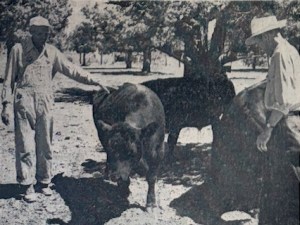Flashback: Separating boys from cigaraettes; Dog Samaritan priest hunts pooch’s owner; City officials feel prepared for Y2K glitch
Published 12:00 am Thursday, April 18, 2024

- Despite warm spring weather, Mandy Kinney, 14, and Ali Sandiford, 13, winced at the cold water of the Deschutes River last week as they rode through a flooded area near Tetherow Crossing. No fair weather riders, the girls said they get out with their horses any day they can.
100 Years Ago
Trending
April 24, 1924 — Cigarettes lose out for boys
The council meeting Tuesday night brought an order to City Marshal Toney to take vigorous steps to stop the smoking of cigarettes by minors in Redmond. There has been some complaint that boys are disregarding the law that prohibits a minor from buying, smoking or having in his possession cigarettes.
Marshal Toney states that he is going to get the proper age of every boy in Redmond who is under age and check up on the situation. In this way he believes that no one is going to get by with it if he can prevent.
Trending
75 Years Ago
April 21, 1949 — Dog Samaritan priest hunts pooch’s owner
There’s a black-and-tan dog in Redmond who owes his life to Bill Priest, manager of Bend-Portland Truck service.
The little dog, obviously lost, showed up not long ago at the truck service, and Priest and the staff of Suter’s Drive-In kept him fed. One day, about two weeks ago, Priest found the dog had been shot on both sides with a pellet gun.
No veterinarian was available, so Priest asked a Redmond physician for advice and obtained some penicillin to put in the dog’s wounds.
The next Monday he took the dog to a veterinary hospital, where the lead pellets were removed.
The dog has recovered, but he still spends most of his time hunting for his owner.
“He’s been around children and cats a lot because he’s crazy about them.” Priest said, “I wish I could find his owner, because that dog is lonely-and besides, I have a $10 hospital bill invested in him!”
50 Years Ago
April 24, 1974 — Ag center decision expected
The final plan for US. Department of Agriculture one-stop agricultural service centers in Oregon will be revealed Friday, May 3.
State conservationist James W. Mitchell, U.S. Soil Conservation Service, will explain the plan at the State Soil and Water Conservation Commission meeting at 9:30 a.m. that morning in Room 44 of the State Agriculture Building, Salem.
At the close of a public hearing two weeks ago in Bend, Mitchell said he felt there would be some changes from the preliminary plan proposed in March by the USDA State Agriculture Committee. That proposal had called for a full-service center in Redmond with a branch office in Madras.
At the hearing, Central Oregonians had asked that Madras also be given a full-service center, and Prineville at least a branch.
The one-stop centers would represent a consolidation of services now offered through separate offices for Farmers Home Administration (FHA), Agricultural Stabilization and Conservation Service (ASCS), Soil Conservation Service (SCS), and in some areas, the Federal Crop Insurance Corporation (FCIC).
25 Years Ago
April 21, 1999 — City officials feel prepared for Y2K glitch
The bad news about the Year 2000 and the City of Redmond is residents will get their sewer bills on time.
The good news is folks will be able to flush.
Amid all the public nervousness about what the millennial roll-over may do to computers, the city’s Computer and Information Systems Administrator, Tim Bryan, expects the new year to bring few problems.
“I’m going to be at home in bed,” Bryan joked. Then he admitted he may check in at the office that night, just to be sure.
The bottom line, however, is that Bryan and other city workers believe they will be ready when computers the world over stumble over their internal calendars.
“A lot of people have already decided we’re going to have problems, and they want to know what we’re going to do,” Bryan said of the calls the city has been getting.
“I have full confidence in the work we have done to date,” he added.
The Year 2000 problem, or Y2K as it is known, refers to a design problem in many computers in which the first two digits of their internal calendars are fixed at 19. Because of this, the machines are unable to recognize the year 2000.
Depending on the computer and programming, problems may range from faulty dates on documents to a complete lock-up of the machine.
The city uses computers for nearly every aspect of its work — billing, records, communications. Computers control services such as the sewage treatment system and municipal well pumps.
In addition, dozens of pieces of equipment use computer chips — fire and police radios, copy machines and emergency medical equipment.
“There are a lot of issues outside of computers,” Bryan said. “We’re even looking at our pagers.”
The city started tackling the Year 2000 problem in 1997, and set up a schedule to have its equipment updated, or compliant, before the end of 1999.
That schedule included four steps and dates by which they are to be completed: Assessment by Dec. 15, 1998; research by March 15, 1999, implementation by June 15, 1999 and re-evaluation by Sept. 15, 1999.
Assessment has been completed. That included taking an inventory of all the equipment and software that might be affected. Portions of the other tasks have been completed.
One of the largest tasks to date was updating software in the city’s finance department computer system. While the hardware was built in 1997 and was Year 2000 compliant, the programs and documents needed to be revised. Bryan said that job took 40 hours.
About 20 individual computer work stations have been replaced.
“A lot of them would have been due for replacement anyway,” he said, explaining that the city replaces its equipment on about a five-year rotation.
The city’s water and sewer system has also been inventoried and upgraded, said Pat Dorning, water division supervisor.
“We’re really not expecting any disastrous events,” Dorning said.
But city officials are not taking for granted they will have no problems. For example, electrical companies acknowledge there is a possibility of power outages.
A contingency plan has been developed that includes such things as making sure there’s extra fuel available to run backup generators at city water wells.
Dorning said the well pumps can be controlled manually if needs be, and a portable generator will be ready to drive sewer pump stations.
“We’re concerned with making sure all the critical things work, like will we have drinking water and will sewer pumps work?,” Dorning said.








